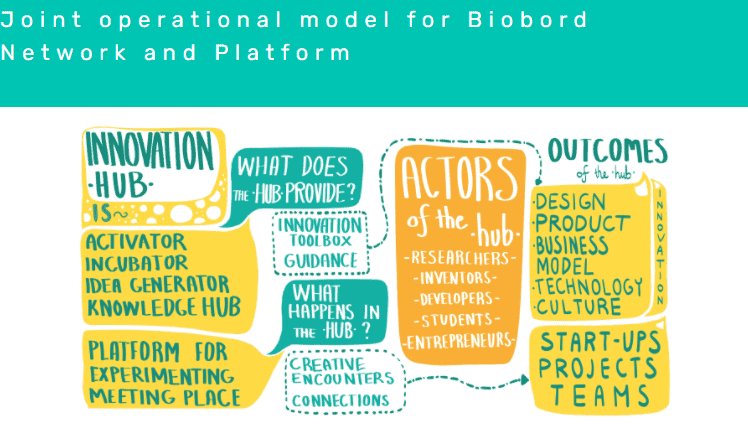RDI2CluB
Bioeconomy means economic activities that utilise the biological natural resources and turn them into food, energy, and other products and services providing jobs and business opportunities. The rural areas of Baltic Sea region have a great potential for bioeconomy as they have abundant natural resources. However, these regions struggle to reach their full potential due to limited human capital, business networks and clusters. So far, the small and medium-size enterprises (SMEs) in bioeconomy are mostly in traditional, resource-based industries that have not taken full advantage of latest technology and service innovations.
The rural areas across the Baltic Sea region have limitations in reaching their full bioeconomy potential. SMEs in these regions are mostly in traditional, resource-based industries. The regional knowledge exchange is generally limited and occurs mainly among local actors. Limited human capital, lack of agglomeration economies, low levels of firm clustering and a weak endowment with knowledge generation organizations are characteristic of organizationally thin regional innovation systems (RIS). Five regions identified by the project needed interregional knowledge and networking pipelines to strengthen their competitiveness in bioeconomy.
The project RDI2Club aimed to support smart, sustainable and inclusive growth of the bioeconomy in rural areas of the Baltic Sea region. It intended to help innovation actors apply EU smart specialisation approaches to their specific field and region, and create bio-business hubs to improve innovation management.
Budgets
in numbers
-
2.66MillionTotal
-
1.50MillionErdf
-
0.00MillionEni + Russia
-
0.39MillionNorway
Achievements
The project is based on the Baltic Sea region’s reputation as a region combining amble natural resources with technological and environmental knowledge. RDI2CluB – and its extension project Connected by BioBord – established a network of bioeconomy regions and actors around the Baltic Sea. This includes Central Finland, Inland Region (Norway), Vidzeme (Latvia), Świętokrzyskie (Poland) and Estonia. Expertise in bio-based business was connected with smart specialisation strategies that prioritise knowledge-based, sustainable bioeconomy to drive rural development.
For a better understanding of the current situation, the project mapped five regions in Estonia, Finland, Latvia, Norway and Poland to develop their bioeconomy profiles and benchmarks for bioeconomy development. Based on that, the project partners elaborated on the action plans for each region presenting the biggest potential and promising interfaces for bioeconomy products, related services and knowledge-based jobs. The collected data from mapping and action plans fed into the prototype of a web tool called the Biobord platform, the testing of which started in April 2019 and involved small and medium sized enterprises (SMEs) from all the regions. The Biobord platform is aimed for networking and supporting tools for innovating that connects bioeconomy developers.
The regions shared an aspiration to strengthen their regional innovation processes with stronger international cooperation. So-called Joint Action Plans were drawn to identify common interests in bioeconomy development and to steer cross-regional cooperation. The project established BioBord platform with a joint operating model for innovation cooperation. The platform would enable the regions to tap into a wider pool of talent and expertise. It also offered access to innovation support and networks across those bioeconomy regions.
Outputs
Joint Action Plans and Regional Bioeconomy Profiles
Biobord Platform

Project Stories
-
27.09.2021
Bio- and circular economy initiatives funded by the Baltic Sea Region Programme inspire
Transnational projects on bio- and circular economy funded by the current and earlier Interreg Baltic Sea Region Programmes are highlighted in the recent article published by the Baltic institute of Finland. They are taken as inspiring examples and good practices in the framework of the Smart Specialisation approaches.Read full story -
05.10.2021
How Biobord network boosts rural bioeconomy through open innovation and co-creation
This story is about bioeconomy developers with a passion for building smart, viable rural economy in the Baltic Sea region. It is about open innovation developed in a dialogue and co-creation. It is also about connecting talented people living in small communities in the middle of fields and forests eager to find solutions for sustainable and healthy food production, natural resources management and development of new and improved technologies. Read about #MadeWithInterreg Biobord network.Read full story
Partners
JAMK University of Applied Sciences
- TownTarvaala
- RegionKeski-Suomi
- CountryFinland
- RepresentativeAnna Aalto
- Phone
- E-Mail
- Web
Regional Council of Central Finland
- TownJyväskylä
- RegionKeski-Suomi
- CountryFinland
- RepresentativeSuvi Bayr
- Phone
- E-Mail
- Web
SSYP Kehitys Oy Ltd.
- TownSaarijärvi
- RegionKeski-Suomi
- CountryFinland
- RepresentativeTiina Tarvainen
- Phone
- E-Mail
- Web
Inland Norway University of Applied Sciences
- TownElverum
- RegionHedmark
- CountryNorway
- RepresentativeEirik Messelt
- Phone
- E-Mail
- Web
Hedmark County Council (SUCCEEDED by PP13 (01.01.2020))
- TownHamar
- RegionHedmark
- CountryNorway
- RepresentativeØyvind Nordstrand
- Phone
- E-Mail
- Web
Tretorget Ltd
- TownElverum
- RegionHedmark
- CountryNorway
- RepresentativeIngrid Hvidsten Gabrielsen
- Phone
- E-Mail
- Web
Regional Science and Technology Center
- TownChęciny
- RegionKielecki
- CountryPoland
- RepresentativeMonika Malanowicz
- Phone
- E-Mail
- Web
Świętokrzyskie Voivodeship
- TownKielce
- RegionKielecki
- CountryPoland
- RepresentativeEwa Walas
- Phone
- E-Mail
- Web
Foundation for Education and Social Dialogue PRO CIVIS
- TownKielce
- RegionKielecki
- CountryPoland
- RepresentativeEwelina Piotrowska
- Phone
- E-Mail
- Web
Institute for Environmental Solutions
- TownPriekuļi
- RegionVidzeme
- CountryLatvia
- RepresentativeRoberts Rotbergs
- Phone
- E-Mail
- Web
Vidzeme Planning Region
- TownCēsis, Cēsu novads
- RegionVidzeme
- CountryLatvia
- RepresentativeSanta Niedola
- Phone
- E-Mail
- Web
Stockholm Environment Institute Tallinn Center
- TownTallinn
- RegionPõhja-Eesti
- CountryEstonia
- RepresentativeKaja Peterson
- Phone
- E-Mail
- Web
Inland County Council
- TownHamar
- RegionHedmark
- CountryNorway
- RepresentativeØyvind Nordstrand
- Phone
- E-Mail
- Web
-
Project managerRiikka KumpulainenJAMK University of Applied Sciences
-
Legal representativeJussi HalttunenJAMK University of Applied Sciences
-
Financial managerTeemu RiikonenJAMK University of Applied Sciences
-
Communication managerTanja MinkkinenJAMK University of Applied Sciences



